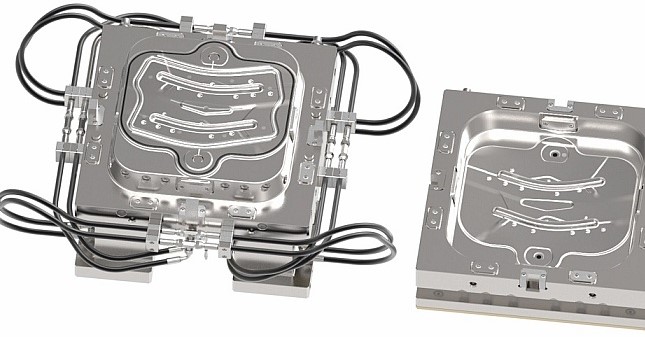Epoxy/carbon fiber composite is 80% lighter than equivalent metal part
Cannon Tipos has collaborated with Coriolis Composites to develop fast and accurate High Pressure Resin Transfer Molding (HP-RTM) of a nearly net shaped dry preform. The part, the company highlights, is manufactured with Coriolis’ patented automated fiber placement (AFP) technology.
Coriolis Composites is a world leader in the supply of AFP robotic equipment and machines, which enable the placement of continuous or discontinuous fibers with minimal material waste, in various orientations, even for complex geometric surfaces. It has developed a unique process for manufacturing functionalized dry fiber preforms of composite parts for a wide range of industrial sectors, in particular aerospace and automotive.
“It was only in the last decade that advanced and cost-effective engineering preform technologies emerged, replacing the need for time-consuming and precise alignment of multiple preforms in an HP-RTM mold,” said Andrea Castelnovo, Cannon R&D and Technology Manager. Types.
“The innovative near-net-form dry preform developed through the Coriolis AFP process and our steel mold, polished to a mirror finish, and high-pressure metering machines and injection equipment helped make a complex structural part of blank bodywork for premises using a single preform in a quick and easy process with high productivity and sustainable costs”.
The dry AFP 2D preform is composed of an optimized fiber orientation of Unidirectional (UD) nonwoven carbon fiber layers (280 g/m2 layer) with a fiber volume fraction (FVF) of 55%, achieving mechanical properties superiors in the final part and incorporates patented union technology compatible with a fast-curing epoxy resin system.
Preform functionalization improves formability, permeability, and trim (via 3D waterjet) for net shape contour and reduces total waste by 50%.
The 2D preform is placed in 30 seconds in a tool that is then heated in an oven to give it a 3D shape in a one-minute cycle time, according to Castelnovo. “Actual cycle time for the HP-RTM process is three minutes, and we’re looking at a production run of 250,000 parts,” he adds.
Cannon Tipos designed the steel mold to resist up to 120 bar (1740 psi) of pressure, thus avoiding microporosity. A constant temperature is maintained within 2°C to ensure optimal reaction of the resin with the hardener to minimize back pressure during the infusion phase and maximize vacuum time to prevent washout and air bubbles. In addition, highly polished cavities take full advantage of the final molded part surface aesthetics that can be achieved with Coriolis preform technology.
The resulting local BIW structural part for series production is undergoing qualification tests. It has a takt time of 20 seconds, the speed needed to complete a product to meet customer demand, and shows equivalent mechanical performance compared to existing metal solutions, while delivering up to 80% weight reduction.

